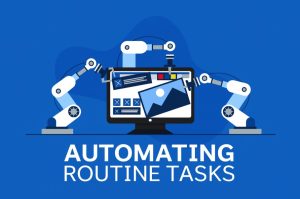Blog
How Do
AI Virtual Assistants Improve Customer Experience and Efficiency?
In today’s fast-paced business landscape, organizations are constantly seeking
innovative solutions to optimize operations and deliver superior

In today’s fast-paced business landscape, organizations are constantly seeking innovative solutions to optimize operations and deliver superior customer service. AI virtual assistants are emerging as powerful tools, transforming how businesses interact with clients and manage internal processes.
The Rise of Intelligent Automation.
The demand for instant, personalised service is higher than ever. Customers expect immediate responses, tailored solutions, and seamless interactions across all channels. Meanwhile, businesses are under pressure to reduce costs, improve productivity, and maintain a competitive edge. This is where AI virtual assistants step in, providing a unique blend of human-like interaction and machine intelligence. These systems are designed to understand, interpret, and respond to customer inquiries, automate routine tasks, and provide valuable insights that drive business growth.
1. Personalized Customer Interactions
These are changing the game for customer service by offering hyper-personalized experiences.
Understanding Customer Needs.
Traditional customer service often relies on generic scripts and standardized responses. AI virtual assistants, on the other hand, can analyze customer data, past interactions, and real-time behavior to understand individual needs and preferences. By leveraging natural language processing (NLP) and machine learning, these systems can interpret the nuances of human language, identify customer sentiment, and tailor responses accordingly.
Delivering Tailored Solutions.
Based on this understanding, it can deliver personalized recommendations, customized offers, and proactive support. For example, an AI virtual assistant on an e-commerce website might suggest products based on a customer’s browsing history or offer a discount on items they have previously viewed. In a customer service setting, it might proactively offer assistance based on the customer’s current activity or provide personalized troubleshooting steps based on their specific issue.
Building Stronger Relationships.
Personalized interactions lead to increased customer satisfaction, loyalty, and advocacy. Customers are more likely to stick with a brand and refer others to it when they feel appreciated and understood. AI virtual assistants help businesses build stronger, more meaningful relationships with their customers by providing consistent, personalized experiences across all touchpoints.
2. Streamlined Operations and Improved Efficiency
Beyond customer service, these are revolutionizing internal operations, freeing up human employees to focus on more strategic and creative tasks.
Automating Routine Tasks:
Many business processes involve repetitive, time-consuming tasks that can be easily automated. It can handle these tasks with speed and accuracy, reducing the burden on human employees and improving overall efficiency. Examples include:
- Scheduling appointments: It can manage calendars, schedule meetings, and send reminders, eliminating the need for manual coordination.
- Processing invoices: It can automatically extract data from invoices, verify information, and initiate payment processes.
- Answering frequently asked questions (FAQs): It can provide instant answers to common customer inquiries, reducing the workload on customer service representatives.
- Data entry and management: It can automate data entry tasks, ensuring accuracy and freeing up employees to focus on more strategic activities.

Optimizing Workflows.
By automating routine tasks, these streamline workflows and improve overall operational efficiency. This leads to reduced costs, improved productivity, and faster turnaround times. For example, an AI virtual assistant can automatically route customer inquiries to the appropriate department, reducing wait times and improving customer satisfaction. In a manufacturing setting, it can monitor production lines, identify potential bottlenecks, and trigger alerts to prevent downtime.
Freeing Up Human Employees.
Perhaps the most significant benefit of AI virtual assistants is their ability to free up human employees to focus on more strategic and creative tasks. By automating routine tasks, these systems allow employees to concentrate on activities that require critical thinking, problem-solving, and emotional intelligence. This leads to increased job satisfaction, improved employee retention, and a more engaged and productive workforce.
3. Data-Driven Insights and Decision-Making.
These are not just about automation; they also provide valuable data-driven insights that can inform business decisions and drive growth.
Collecting and Analyzing Data.
It collects vast amounts of data from customer interactions, internal processes, and external sources. This data can be analyzed to identify trends, patterns, and insights that would be difficult or impossible to uncover manually. For example, an AI virtual assistant can track customer sentiment, identify common pain points, and provide feedback on product or service improvements.
Identifying Trends and Patterns.
By analyzing customer data, it can identify emerging trends and patterns that can inform product development, marketing strategies, and customer service initiatives. For example, an AI virtual assistant might identify a growing demand for a particular product or service, allowing the business to capitalize on this trend. It might also identify common customer complaints, allowing the business to address these issues and improve customer satisfaction.
Improving Decision-Making.
Data-driven insights can improve decision-making at all levels of the organization. By providing accurate, timely, and relevant information, these empower managers to make more informed decisions about resource allocation, product development, and marketing strategies. This leads to improved efficiency, reduced costs, and increased profitability.
4. 24/7 Availability and Scalability:
Businesses need to be available to their customers around the clock, but maintaining a 24/7 human workforce can be expensive and challenging. It offers a cost-effective solution by providing round-the-clock support and scalability.
Providing Round-the-Clock Support.
It can provide instant answers to customer inquiries 24 hours a day, 7 days a week, without the need for human intervention. This is particularly valuable for businesses with global customers or those that operate in different time zones. By providing round-the-clock support, AI virtual assistants improve customer satisfaction, reduce wait times, and increase sales.
Scaling Operations Effortlessly.
As businesses grow, they need to be able to scale their operations quickly and efficiently. It offers a scalable solution that can adapt to changing business needs without requiring significant investments in infrastructure or personnel. Whether it is handling a sudden surge in customer inquiries or expanding into new markets, it can scale up or down as needed, without disrupting operations or impacting customer service quality.
Embracing the Future with AI Virtual Assistants:
These are rapidly transforming the way businesses operate and interact with their customers. By automating routine tasks, personalizing customer interactions, providing data-driven insights, and offering 24/7 availability, these systems are helping businesses improve efficiency, reduce costs, and deliver superior customer experiences. AI technology will become even more advanced and powerful as it develops further, and it will have a bigger impact on how business is conducted in the future.
Recent Posts
- How Does Our AI Sales Copilot Solve Customer Support Challenges for Australian Businesses?
- How AI for Sales Teams Reduces Manual Work and Increases Efficiency?
- Why Do Workflow and Process Automation Matter for Growing Companies?
- How Can AI Helpdesk Software Assist With High-Volume Customer Queries?
- Where to Get Affordable and Scalable AI Intelligent Automation Tools?
Recent Comments
Archives
Categories
- Advanced Process Automation
- AI Assistant Integration
- AI Conversational Assistant
- AI Customer Service Assistants
- AI Digital Assistant
- AI for Sales Teams
- AI Helpdesk Software
- AI Helpdesk Solution
- AI Knowledge Base Assistant
- AI Office Assistants
- AI Sales Analytics
- AI Sales Copilot
- AI Sales Managers
- AI Sales Performance
- AI Self-Service Support
- Ai Support System
- AI Task Assistant
- Artificial Intelligence
- Business Automation
- Business Planning
- Uncategorized
- Workflow and Process Automation
Recent Posts
- How Does Our AI Sales Copilot Solve Customer Support Challenges for Australian Businesses?
- How AI for Sales Teams Reduces Manual Work and Increases Efficiency?
- Why Do Workflow and Process Automation Matter for Growing Companies?
- How Can AI Helpdesk Software Assist With High-Volume Customer Queries?
- Where to Get Affordable and Scalable AI Intelligent Automation Tools?

